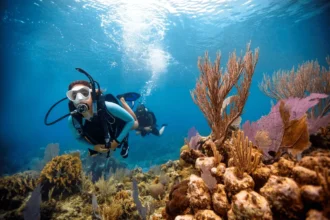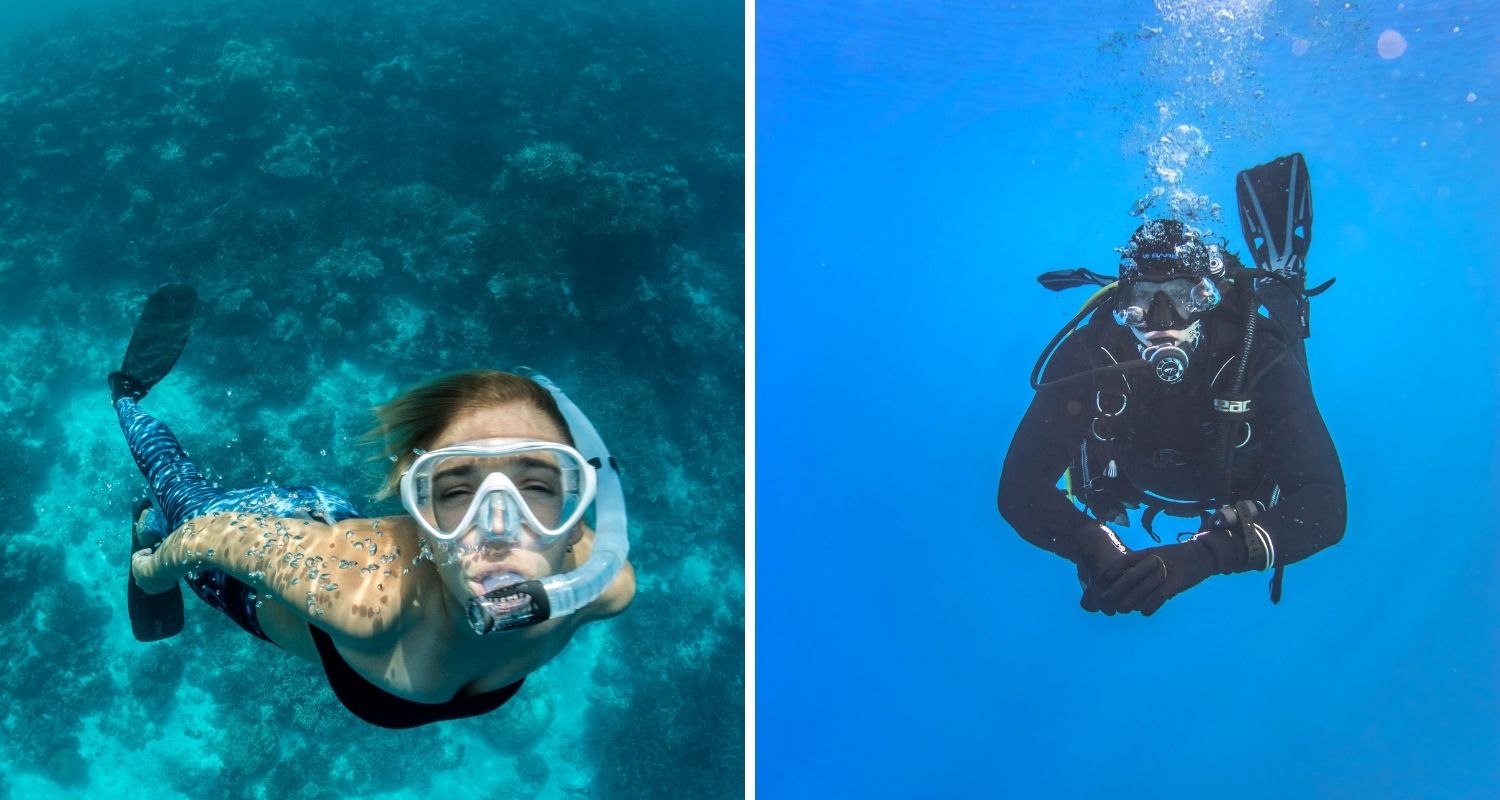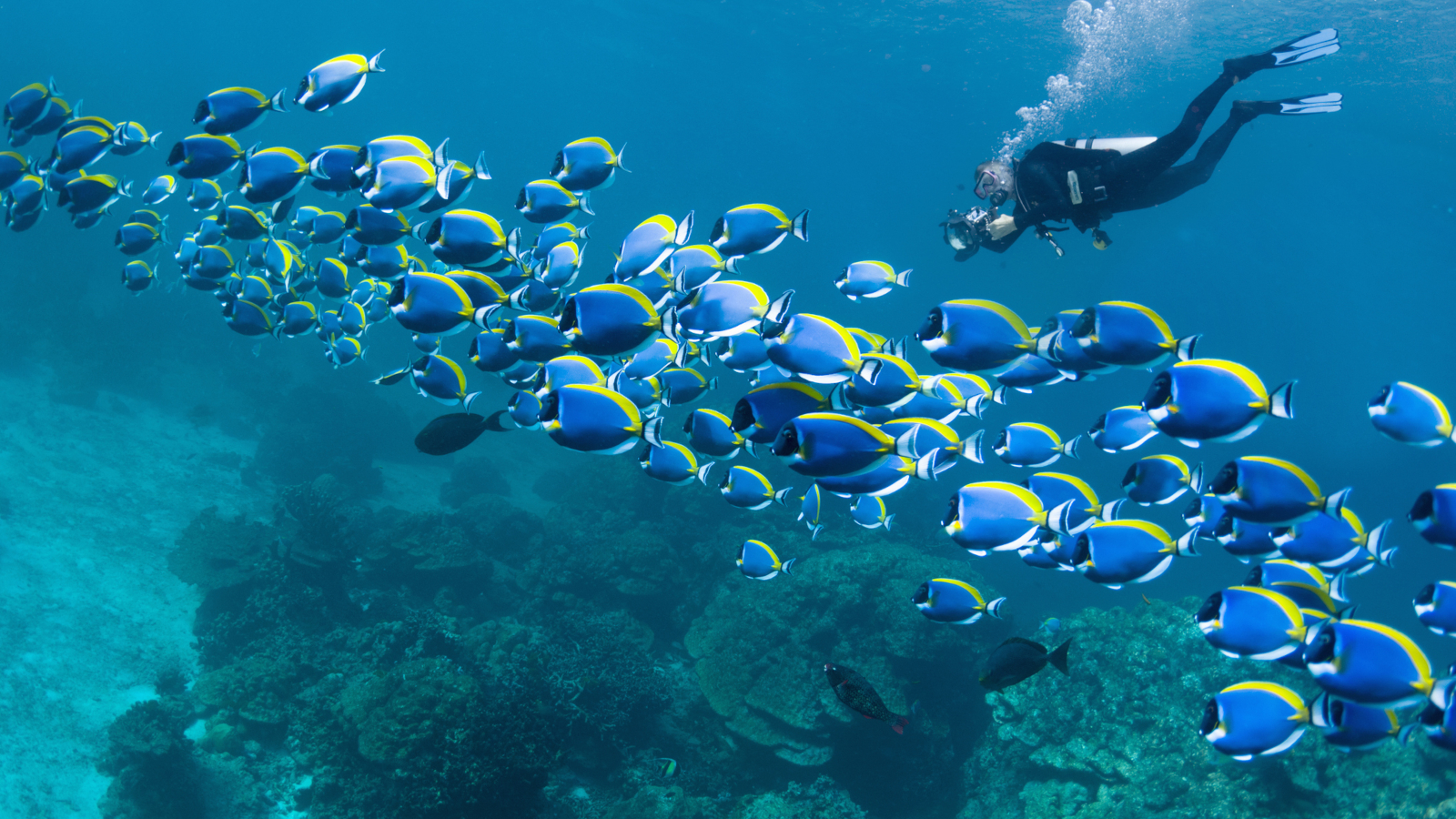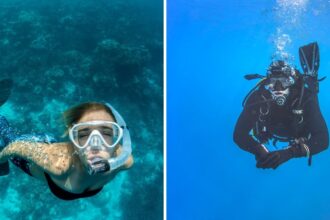Saving air while scuba diving is one of the most important skills every new diver should learn. When you conserve air, you stay underwater longer, enjoy more relaxed dives, and improve your overall safety. Many beginners finish their tanks much faster than others, not because they are unfit, but because they simply don’t know the right breathing and buoyancy techniques.
- Why saving air matters for beginner divers
- 1. Practice slow and deep breathing before diving
- 2. Stay relaxed and avoid unnecessary movements
- 3. Improve your buoyancy control early on
- 4. Use your fins correctly with slow, controlled kicks
- 5. Maintain a horizontal diving position
- 6. Stay close to your dive buddy and avoid swimming against currents
- 7. Keep your equipment lightweight and correctly fitted
- 8. Don’t use your hands to swim
- 9. Descend and ascend slowly and steadily
- 10. Keep your mind calm and avoid panic breathing
- 11. Plan your dive and follow a smooth route
- 12. Stay hydrated before your dive
- 13. Equalize early and often to avoid discomfort
- 14. Choose the right weights to avoid extra effort
- 15. Dive often and practice regularly
- Common reasons beginners waste air quickly
- When should beginners start focusing on air conservation?
- Final tips for saving more air on your next dive
- FAQs
If you are preparing for your first few dives or planning a scuba trip soon, this guide will help you understand how to use your air wisely. On Scooba Dive Guide, we help beginners learn safe and smart diving habits, and air conservation is a key part of that.
In this article, you will learn fifteen proven and easy techniques to help you save more air on every dive. All the methods shared here are beginner-friendly and approved by experienced divers and instructors.
Let’s get started.
Why saving air matters for beginner divers
When you conserve air, you increase your dive time without needing additional gear or training. This means you can explore more reefs, see more marine life, and improve your skills faster.
Saving air is also important for comfort. New divers often breathe fast because of stress, fear, or excitement. Once you learn how to control this, your dives become calmer, safer, and far more enjoyable.
1. Practice slow and deep breathing before diving
Many new divers breathe quickly because of nervousness. Slow, deep breathing helps relax your body and reduces oxygen use. Try practicing long inhales and steady exhales even before you jump into the water. When your body is calm, your air lasts longer during the dive.
2. Stay relaxed and avoid unnecessary movements
Every extra movement you make underwater uses more energy. The more energy you use, the more air you consume. Try to stay loose, relaxed, and comfortable. Move your arms as little as possible and rely mostly on your fins to glide through the water.
3. Improve your buoyancy control early on
Good buoyancy control is one of the strongest ways to save air. When you float effortlessly in the water without sinking or rising too much, you don’t waste energy. Take time to master buoyancy in shallow water. You can also read our beginner guides on Scooba Dive Guide to improve your diving skills.
4. Use your fins correctly with slow, controlled kicks
Fast and strong kicks may feel powerful, but they waste a lot of air. Instead, use slow and controlled frog kicks or flutter kicks. Efficient finning reduces drag and keeps your breathing steady.
5. Maintain a horizontal diving position
Your body position matters when it comes to saving air. A horizontal, streamlined position helps you move smoothly and reduces resistance. If your legs drop or your torso rises, your body uses more effort to move forward, which increases air use.
6. Stay close to your dive buddy and avoid swimming against currents
You consume more air when you swim alone, swim too fast, or swim against strong currents. Staying close to your buddy allows you to move at a steady pace and conserve energy. If you face a current, swim diagonally or use the reef for shelter instead of fighting it head-on.
7. Keep your equipment lightweight and correctly fitted
Heavy or poorly fitted gear makes you work harder underwater. If your fins are too stiff or your mask leaks, you burn more energy and use more air. Make sure your equipment fits comfortably and is not overly heavy.
8. Don’t use your hands to swim
Many beginners wave their hands or paddle unconsciously. Doing this wastes energy and makes your breathing faster. Try to keep your arms still along your body, and let your fins do all the work.
9. Descend and ascend slowly and steadily
Quick changes in depth can make your body adjust too fast, leading to rapid breathing. Controlled and slow descents or ascents help keep your breathing calm. They also improve your overall underwater stability.
10. Keep your mind calm and avoid panic breathing
Panic is one of the biggest causes of air loss among new divers. If you feel anxious, pause for a moment, slow your breathing, and let your body relax. Remember that scuba diving is a slow and peaceful activity, not a race.
11. Plan your dive and follow a smooth route
A planned route helps you avoid unnecessary swimming and saves energy. Before entering the water, understand your dive site, currents, depth, and exit points. Following a clean, smooth path reduces both effort and air use.
12. Stay hydrated before your dive
Many divers don’t realize that hydration affects air consumption. When you are dehydrated, your body works harder, and your breathing becomes heavier. Drink water before your dive and avoid alcohol or heavy meals.
13. Equalize early and often to avoid discomfort
If your ears hurt or you struggle with pressure changes, you may start breathing faster out of discomfort. Equalizing early and regularly keeps you relaxed and helps prevent stress breathing.
14. Choose the right weights to avoid extra effort
Being overweighted makes you kick harder and breathe faster. Being underweighted makes you struggle to stay down. Using the right amount of weight helps you stay balanced, relaxed, and comfortable underwater.
15. Dive often and practice regularly
The more you dive, the better your breathing and buoyancy become. Experience is the most powerful way to reduce air consumption. Try to dive often or practice in a pool between trips so your breathing becomes natural and efficient.
Common reasons beginners waste air quickly
Many new divers face the same challenges that cause high air consumption. These include nervousness, poor finning technique, wrong body position, lack of buoyancy control, and swimming too fast. Understanding these issues early helps you correct them quickly.
If you want to improve faster, explore helpful beginner diving guides on Scooba Dive Guide, where we share easy tips, gear suggestions, and travel advice for new divers.
When should beginners start focusing on air conservation?
You don’t need to worry about air on your very first introductory dive. But once you start doing Open Water dives, it becomes important. The earlier you learn proper breathing and buoyancy, the better diver you will become.
Good habits formed early help you enjoy longer, safer, and more relaxed dives.
Final tips for saving more air on your next dive
Always remember that diving is meant to be slow, peaceful, and comfortable. Move gently, breathe calmly, and stay relaxed. Your breathing improves naturally as your confidence grows. With time, you will notice that your tank lasts much longer.
If you want more beginner diving tips or are planning your next underwater trip, visit Scooba Dive Guide for easy and helpful scuba resources.
Start practicing these techniques on your next dive and enjoy longer, more beautiful underwater moments.
FAQs
How can new divers improve their breathing underwater?
New divers can improve their breathing by practicing slow and deep breaths, staying relaxed, and improving buoyancy. With time and regular practice, breathing becomes more natural and comfortable.
Does swimming fast make you use more air while scuba diving?
Yes, swimming fast uses more energy and increases your breathing rate. Moving slowly and calmly helps you save air and remain relaxed throughout the dive.
Why do beginners run out of air faster than others?
Most beginners run out of air quickly because of nervousness, poor buoyancy, swimming too fast, or moving too much. As you gain experience and learn proper techniques, your air consumption improves naturally.
Can proper finning technique help save air?
Yes, using slow and controlled fin kicks reduces drag and effort. This helps you conserve air and maintain better underwater control.
Is saving air important for shallow dives?
Yes, saving air is helpful even in shallow dives. When you conserve air, you extend your dive time and enjoy the underwater scenery longer without rushing.




